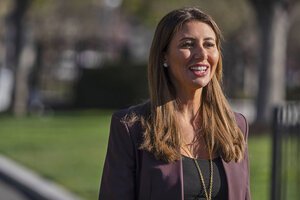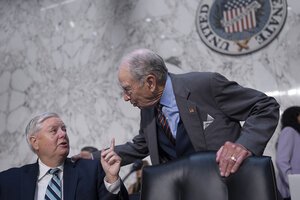In the span of less than a week, the Trump administration has won confirmation for one of the president’s former personal attorneys to a lifetime federal judgeship while reinstalling another as the top federal prosecutor in New Jersey – the latest in an ongoing push to remake the judicial system by putting allies in prominent posts.
On Tuesday night, the U.S. Senate confirmed Emil Bove to the U.S. Court of Appeals for the Third Circuit by a one-vote margin, giving the president’s former lawyer a lifetime appointment to the Philadelphia-based court. GOP senators waved off a trio of whistleblowers’ accusations that as acting Deputy Attorney General Mr. Bove had suggested prosecutors should ignore court orders, and misled lawmakers about his role in dismissing corruption charges against New York Mayor Eric Adams.
Mr. Bove’s confirmation came just days after the Trump Justice Department used a highly unusual workaround to reinstate Alina Habba, another former personal attorney of the president’s, as acting U.S. attorney in New Jersey – one of several recent cases of circumventing congressional oversight to put loyalists in key prosecutorial positions.
Why We Wrote This
The judicial branch has consistently put checks on President Donald Trump’s second term agenda. Now he seems interested in molding the judiciary in the same way he’s already reshaped the Department of Justice, emphasizing personal loyalty.
With Republicans in control of Congress and largely in lockstep with the president, the federal judiciary has been the only significant source of governmental resistance to Mr. Trump in his second term. While the conservative-dominated Supreme Court has greenlit many of his actions, lower court judges have routinely ruled against him and his Justice Department, triggering fury from the president.
Now, as he escalates his battle with the judicial system, he seems interested in reshaping the judiciary itself in the same way he’s already reshaped the Justice Department.
Gregg Nunziata, executive director of the Society for the Rule of Law, a group of conservative lawyers who oppose Mr. Trump, says that Mr. Bove, Ms. Habba, and Todd Blanche, a third lawyer who worked for Mr. Trump during his legal travails who got a top Justice Department slot, are “all people distinguished by and known for their personal loyalty to the president, and their partisan rhetoric, not for their commitment to the rule of law.”
The concern, he adds, is that the administration is trying to steer the judiciary “towards a more partisan, results-oriented institution.”

Mark Schiefelbein/AP/File
Alina Habba, President Donald Trump’s former lawyer and his pick to be the interim U.S. attorney for New Jersey, arrives to speak with reporters outside the White House, March 26, 2025, in Washington.
With only a handful of judges confirmed so far this term, it may be too early to tell if Mr. Bove is an anomaly or the start of a trend for Trump’s judicial picks. But the Trump administration’s combative rhetoric concerning the courts, and its increasing willingness to bypass Congress and judges to keep high-ranking prosecutors in power, suggests an escalation in its power struggle with the judiciary.
The DOJ is currently suing all of Maryland’s district court judges, and on Monday filed a misconduct complaint against U.S. District Court Chief Judge James Boasberg in Washington for comments he made at a judicial conference, warning that the Trump administration might “disregard rulings of federal courts” and trigger “a constitutional crisis.”
The moves have outraged Democrats.
Delaware Sen. Chris Coons, a Democrat who sits on the Senate Judiciary Committee and whose home state, along with New Jersey and Pennsylvania, is under the jurisdiction of the circuit court Mr. Bove now sits on, says President Trump’s decision to “install a series of loyalists who have represented him” is undermining the independence of the legal system.
“The consequences for the legitimacy, independence, and capabilities of the Department of Justice, the U.S. Attorney’s offices and federal district courts, I fear, will be grave,” he says.
“A familiar playbook”
Republicans dismiss those criticisms, with multiple senators comparing the last-minute emergence of whistleblowers opposing Mr. Bove to the drama of Supreme Court Justice Brett Kavanaugh’s 2018 confirmation hearing.
“This is a familiar playbook,” says Texas Sen. John Cornyn, a member of the Judiciary Committee. “Mysterious whistleblowers seem to appear – and with less-than-credible allegations.”
Senator Cornyn also waved away concerns about the Trump administration avoiding Senate confirmation for Ms. Habba and other U.S. attorneys, saying it wasn’t much different than when the Biden administration “basically gave the Senate the stiff-arm” with temporary appointments.
Even as Republicans push forward to confirm nearly all of his nominees, President Trump has grown increasingly frustrated at what he perceives as the Senate’s slow pace.
He has repeatedly demanded that Congress officially go on break this August to allow him to make recess appointments without Senate approval.
And within hours of Mr. Bove’s confirmation, the president posted to his Truth Social page demanding that Senate Judiciary Committee Chairman Chuck Grassley end a longstanding custom known as the “blue slip” which gives home-state senators an unofficial power to block judicial confirmations in their own states. (Senate Republicans showed little appetite to meet this particular demand.)

Senate Judiciary Committee Chairman Chuck Grassley of Iowa (right) greets GOP Sen. Lindsey Graham of South Carolina as the panel meets to advance President Donald Trump’s nominees for the federal bench, including Emil Bove, Mr. Trump’s former defense lawyer, at the Capitol in Washington, July 17, 2025.
Ms. Habba had been serving as the interim U.S. Attorney for the district of New Jersey, but as the end date on that position approached last week, federal judges in the district selected a career prosecutor to replace her. Hours after the judges did so, however, Attorney General Pam Bondi announced that she had fired the replacement.
Ms. Bondi then appointed Ms. Habba to the second-ranked position in the district. Because there was no U.S. Attorney in place, Ms. Habba automatically became the district’s top federal prosecutor again.
Democratic Sen. Andy Kim says his state of New Jersey is “bearing the brunt” of President Trump’s attempts to reshape the judicial system.
“People in my state are pissed off, really pissed off, that the Trump administration is circumventing the process here,” he says. The president is elevating “people [whose] top qualification is just loyalty to him, rather than adherence to the Constitution.”
New Jersey isn’t the only state where the Trump administration is trying its novel workaround of the Senate confirmation process.
This week, the Department of Justice made two interim U.S. attorneys in California and Nevada “acting” U.S. attorneys as well. The title change, permitted under the Federal Vacancies Reform Act of 1998, allows Bill Essayli and Sigal Chattah, respectively, to stay in their roles for up to two and a half years without Senate confirmation or judicial appointment.
And earlier this month, John A. Sarcone III went from the interim head of the U.S. Attorney’s office for the Northern District of New York to a “special attorney” position so he could retain his job despite judges preferring otherwise. A panel of judges in the district had made the rare decision to not confirm him to the U.S. Attorney position permanently.
A future Supreme Court pick?
Still, those appointments won’t outlast the Trump administration. Mr. Bove could be on the court for decades.
A federal prosecutor in New York before he was Mr. Trump’s personal lawyer, Mr. Bove returned to the Justice Department upon Mr. Trump’s return to power. He quickly began executing on the president’s vision for the agency, delivering pardons for Trump supporters, and ending investigations into the Jan. 6, 2021 insurrection at the Capitol. He fired dozens of career prosecutors who handled Jan. 6 cases, and spearheaded the legal defenses of the Trump administration’s mass deportation policies. In a Senate questionnaire, he declined to rule out the possibility of Mr. Trump running for a third term.
Supporters offer enthusiastic praise. Mike Davis, founder and president of the Article III Project, a conservative legal organization, said in a statement that Mr. Bove’s track record “terrifies the radical left and rattles the swampy D.C. establishment.”
“Emil Bove isn’t just another judge. He’s a constitutionalist with a spine of steel,” he added.
Soon after Mr. Bove was confirmed, Mr. Davis floated him as a possible future Supreme Court pick.
The first whistleblower came forward the day before Mr. Bove’s confirmation hearing before the Senate Judiciary Committee. Erez Reuveni, a career Justice Department prosecutor fired in April, submitted testimony and provided supporting documents alleging that Mr. Bove had suggested DOJ prosecutors should ignore court orders in a trio of high-profile deportation cases. In a meeting a day before the administration flew hundreds of immigrant detainees to El Salvador, rebuffing a judge’s order to turn the planes around, Mr. Bove allegedly recommended responding to the courts with an expletive.
Mr. Bove waved off the claims during his confirmation hearing. “I don’t think there’s any validity to the suggestion that the whistleblower complaint … calls into question my qualifications to serve as a circuit judge,” he said.
The next day, a second whistleblower came forward to support Mr. Reuveni’s claims. According to Whistleblower Aid, a legal group representing them, that whistleblower provided “substantive, internal” agency documents to the DOJ Office of the Inspector General back in May “that corroborates the thrust” of Mr. Reuveni’s claims.
A third whistleblower spoke out this week, days before the full Senate confirmed Mr. Bove, alleging that the appeals court nominee misled lawmakers about the Justice Department’s dropping of corruption charges against New York City Mayor Eric Adams.
During his confirmation hearing, Mr. Bove characterized his record in a different way. His close affiliation with Mr. Trump – and his decision to serve as legal counsel for the president, fighting what Mr. Bove saw as unjust, politically motivated criminal charges – exemplifies his commitment to impartiality.
“That was a decision to fight for what was right and fight for the rule of law,” he said during his confirmation hearing. “If I am fortunate enough to become a judge, I’ll abide by that standard applying the rule of law every single day.”


